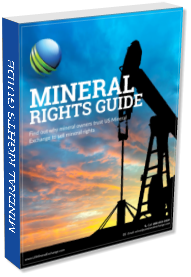
Mineral Rights and Taxes: What You Need to Know
If you’re thinking about selling mineral rights or oil and gas royalties, one of the most commonly overlooked issues is taxes. Whether you inherited the interest or purchased it, the tax consequences of a sale can have a significant impact on your final payout. Fortunately, when properly understood, taxes often work in your favor—especially in states like Texas, where no state capital gains tax applies.
In this guide, we’ll walk you through how mineral rights are taxed, what you’ll owe, how to calculate your tax basis, and why selling is often more tax-efficient than holding.

FREE GUIDE
Download our free mineral rights guide now! Learn more about your mineral rights.

Garrett Phelan
CEO of US Mineral Exchange with over 27 years of experience in the oil and gas industry. For nearly two decades, he has helped individuals, families, trusts, and non-profits navigate the complexities of mineral and royalty rights to achieve the highest sale prices.
Widely recognized as an industry expert, with an unwavering commitment to a client-first philosophy and extensive industry knowledge, he has been featured in Hart Energy, Yahoo Finance, and the Permian Basin Petroleum Association magazine.
1. What Is a Tax Basis and Why Does It Matter?
When you sell mineral rights, the IRS doesn’t tax you on the full sale price. Instead, you’re only taxed on the gain—which is the difference between your sale price and what’s known as your tax basis.
Your tax basis is essentially your starting value. It represents what you originally paid for the asset or, in the case of inherited property, what it was worth at the time it passed to you. This number is the foundation for determining how much of your sale is considered taxable profit.
If You Purchased Mineral Rights
If you bought your mineral rights directly, calculating your basis is straightforward: it’s the amount you paid. Let’s say you purchased the interest for $20,000 and later sell it for $100,000. Your gain—the portion the IRS considers taxable—is $80,000.
Example:
- Purchase Price (Basis): $20,000
- Sale Price: $100,000
- Taxable Gain: $80,000
- Estimated Capital Gains Tax (15%): $80,000 × 15% = $12,000
This means you’d owe approximately $12,000 in federal taxes on the sale, assuming you qualify for long-term capital gains treatment. Read on for more on that qualification.
If You Inherited Mineral Rights
If you inherited your mineral rights, you get a stepped-up basis—meaning the IRS resets the value to the fair market value at the time of inheritance. This can significantly reduce your taxable gain.
Example:
- Inherited Value (Basis): $65,000
- Sale Price: $100,000
- Taxable Gain: $35,000
- Estimated Capital Gains Tax (15%): $35,000 × 15% = $5,250
This reduction in taxable gain compared to a purchased property resulted in nearly $7,000 in tax savings. This difference makes inherited mineral rights especially attractive to sell from a tax-efficiency perspective.
Later in the article we provide you a Real World Example of what selling vs. holding would look like.

Many mineral owners believe that they will owe taxes on the entire amount of the sale. That is not correct!
2. Capital Gains vs. Ordinary Income: What’s the Difference?
The way your income is classified by the IRS has a big impact on how much tax you’ll owe. Mineral owners typically earn income in one of three ways: royalty payments, lease bonuses, or by selling their mineral rights. Each of these is taxed differently, and understanding these differences can help you make smarter financial decisions.
Royalty and lease bonus income are taxed as ordinary income, which often results in a significantly higher tax bill. In contrast, selling mineral rights—if held for more than a year—is treated as a long-term capital gain, which comes with far lower tax rates.
This tax treatment is one of the most important advantages of selling, and a major reason why owners choose to convert future royalty payments into a lump-sum sale.
| Income Type | How You Receive It | Taxed As | Typical Federal Tax Rate |
|---|---|---|---|
| Royalty Income | Monthly royalty payments | Ordinary Income | 22% – 37% |
| Lease Bonus | One-time payment | Ordinary Income | 22% – 37% |
| Mineral Rights Sale | Lump sum | Capital Gains | 0% – 20% |
3. Capital Gains Tax Brackets – 2026
Capital gains tax rates depend on your filing status and total income. Most mineral owners fall within the 0% or 15% tax brackets, especially if the mineral sale is their only large income for the year.
Single Filers
| Capital Gains Rate | Income Range |
|---|---|
| 0% | $0 – $49,450 (Note: 2025 up to $48,350) |
| 15% | $49,451 to $545,500 (Note: 2025 -$48,351 – $533,400) |
| 20% | Over $545,500 (Note: 2025 Over $533,400) |
Married Filing Jointly
| Capital Gains Rate | Income Range |
|---|---|
| 0% | $0 – $98,900 (Note: 2025 up to $96,700) |
| 15% | $98,901 – $613,700 (Note: 2025 -$96,701 – $600,050) |
| 20% | Over $ 613,700 (Note: 2025 Over $600,050) |
Most mineral owners will fall into the 15% bracket, which results in meaningful tax savings compared to the 22%–37% range for ordinary income.
4. The Texas Advantage: No State Capital Gains Tax
Texas is one of the best places to sell mineral rights thanks to its lack of a state-level income tax. Unlike high-tax states such as California or New York, Texas does not tax capital gains. That means mineral owners in Texas are only subject to federal taxes on their gains—resulting in thousands of dollars in savings.
In other states, you could owe up to an additional 10%–13% on top of federal taxes. Texas mineral owners automatically avoid that extra tax burden, making the Lone Star State one of the most tax-friendly environments for mineral sales.
5. Selling vs. Holding: A Real-World Example
Let’s say your mineral rights are worth $100,000. You’re weighing whether to sell now or collect royalty income over the next 10 years.
Option 1 – Collect Royalties
- You receive $10,000 per year for 10 years
- Total income: $100,000
- Taxed at ordinary income rate (28.5% average)
- Taxes paid: $28,500
- Net after-tax income: $71,500
Option 2 – Sell Mineral Rights
- You sell for $100,000 today
- Basis (inherited): $65,000
- Taxable gain: $35,000
- Taxed at 15% capital gains rate = $5,250
- Net after-tax income: $94,750
By selling, you walk away with $23,250 more, and you get that cash in hand immediately. You avoid years of fluctuating royalty payments, the hassle of 1099s, and the risk of declining production or oil prices.
And it doesn’t account for the opportunity cost—if you sold and reinvested the lump sum, those investments are likely to generate additional returns over time.
In short, keeping the royalties may seem like the safer or more familiar path, but it often results in higher taxes and lower overall value.
6. Estimating Basis When Inherited
If you inherited mineral rights many years ago and don’t know the fair market value at that time, we recommend that you estimate the basis using the inflation adjusted price of crude oil or natural gas. Go to the following websites for the inflation adjusted prices – InflationData.com or Macrotrends.net. This method provides the price of oil and/or gas when you inherited the rights to the price when you sell.
Example Calculation:
- Oil price at inheritance (2003): $40.91
- Oil price at sale (2026): $62.50
- Sale price: $100,000
- Estimated basis: (40.91 ÷ 62.50) × $100,000 = $65,456
- Taxable gain: $34,544 ($100,000 less basis of $65,456)
- Estimated tax (15%): $5,181.60
This approach helps fill in gaps when formal appraisals or estate records aren’t available.
Important Note: It is possible that you inherited mineral rights in a year that had a higher price of oil than the year you sold. This means that your basis would be negative. If you are in this situation, we recommend consulting with a qualified CPA on how to handle the gain/loss from the sale. You may not owe any tax at all.
7. Do You Receive a 1099 for Mineral Sales?
In most cases, no—buyers do not issue a Form 1099 for mineral rights sales, because these transactions are not considered real estate transfers, even though they’re often treated like selling land or a house. The IRS explicitly excludes “an interest in surface or subsurface natural resources (e.g., oils, gas, minerals)” from 1099–S reporting when sold separately from real property. That means, legally, buyers don’t have to issue a 1099-S for mineral rights.
What You Must Do as the Seller
- Report the sale on your tax return, regardless of whether you receive a form.
- Use Form 8949 to calculate capital gain or loss (sale price minus your basis).
- Transfer the totals to Schedule D on your Form 1040
- Keep thorough records:
-
- sales contract or closing documents
- proof of your basis (purchase price, fair market value at inheritance, etc.)
- any calculations you made (e.g., inflation-adjusted basis or oil-price basis method)
These documents protect you in case of an IRS audit or inquiry and ensure accurate reporting—even when a 1099 form isn’t issued. If your interest came through a trust or estate, or if the sale involves multiple owners, work with a CPA to ensure it’s reported correctly.
8. Can You Use a 1031 Exchange?
Sometimes. A 1031 exchange allows you to defer capital gains taxes by reinvesting your sale proceeds into another qualifying real estate asset. However, not all mineral rights qualify.
To be eligible:
- The mineral rights must be classified as real property
- You must use a qualified intermediary to handle the transaction
- The replacement property must be identified within 45 days
- The purchase must close within 180 days
If done correctly, you can defer your capital gains taxes entirely. But the rules are strict, and not every sale qualifies. Always consult a 1031 exchange specialist before attempting one.
9. How to Reduce Your Tax Liability
Here are strategies to minimize your tax bill when selling mineral rights:
✅ Just Inherited? Sell sooner to take full advantage of the stepped-up basis
✅ Purchased? Hold longer than 1 year to qualify for long-term capital gains
✅ Use a 1031 exchange if eligible and structured correctly
✅ Keep good records to ensure proper treatment and compliance
✅ Work with US Mineral Exchange and we will walk you through your specific situation
Proper planning can make a huge difference in your after-tax proceeds. Even small adjustments—like the timing of your sale—can result in thousands of dollars in tax savings.
Final Thoughts
Understanding how taxes work when selling mineral rights can give you a major advantage. Between stepped-up basis rules, capital gains treatment, and the benefits of living in a state like Texas, most mineral owners walk away with more than they expect.
Whether you inherited your interest or purchased it, your tax situation could be far more favorable than collecting royalties over time. Selling not only simplifies your financial life—it can also put significantly more money in your pocket.
At US Mineral Exchange, we specialize in helping mineral owners get top dollar while guiding them through the process every step of the way. If you’re ready to explore a sale, contact us today—we’re here to help.
Disclaimer:
This content is for informational purposes only and is not tax, legal, or financial advice. Please consult a qualified professional before making any decisions.
Popular Content
- Sell Mineral Rights
- Mineral Rights Value
- Calculate Value
- Market Value
- Mineral Rights Buyers
- Mineral Rights Appraisal
- Mineral Rights Brokers
- Should you Sell Mineral Rights
- Never Sell Mineral Rights
- 10 Helpful Tips
- Mineral Interest Types Explained
- Common Mistakes
- Mineral Rights & Taxes
- Medicaid & Mineral Rights
- Common Q&A
Free Consultation
Free Consultation
Common Questions
The more information you can provide about your property the better! We can give you a better idea about the value of selling mineral rights if you provide more information. The most important thing we need is for you to answer the questions and provide your state and county.
If you have the required documents to list, providing those is extremely helpful!
Absolutely not! When you inquire at US Mineral Exchange we will not be putting any pressure on you to sell. We will help answer any questions you have whether you are interested in selling or not.
At US Mineral Exchange, we take privacy very seriously. We will NEVER sell your information or use it without your consent. When you send us documentation or tell us about your property, that information does not go outside our company without your consent. Even when you list a property for sale on our website, we strictly control who has access to the information about your listing so that only legitimate buyers will be able to see property details.
Many mineral owners make the mistake of getting an offer and quickly selling. They then accept an offer far below market value because they felt pressure to sell. There is nearly always a better price available.
Imagine you were selling a home. Would you get the best price from a random person who walks up and makes you an offer? No way! Now imagine you list the home on the MLS where thousands of potential buyers know your house is for sale. The key to getting the best price is competition. Our guide to selling mineral rights explains everything.
The reason that so many mineral owners decide to sell mineral rights at US Mineral Exchange is access to our large network of mineral rights buyers. Our goal is to help you get top dollar for selling mineral rights by getting your property in front of a huge audience of buyers. This allows buyers to compete against one another which ensures you get fair market value for selling mineral rights.
There are absolutely no cost to list your property. When you locate a buyer by listing your property with us, we are paid a commission directly by the buyers closing agent. This means you never have any out of pocket expenses ever. We only get paid if we can get you a better price than the current offer you have in hand.

FREE GUIDE
Download our free mineral rights guide now! Learn more about your mineral rights.


